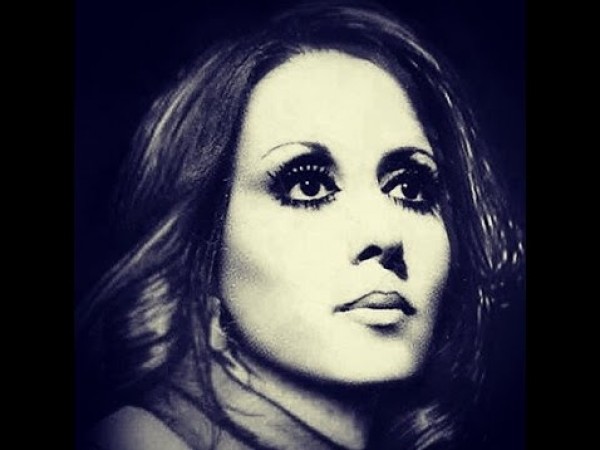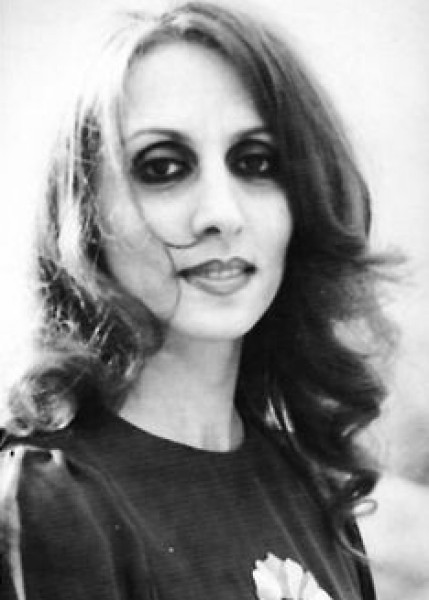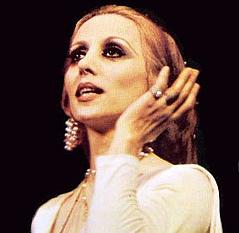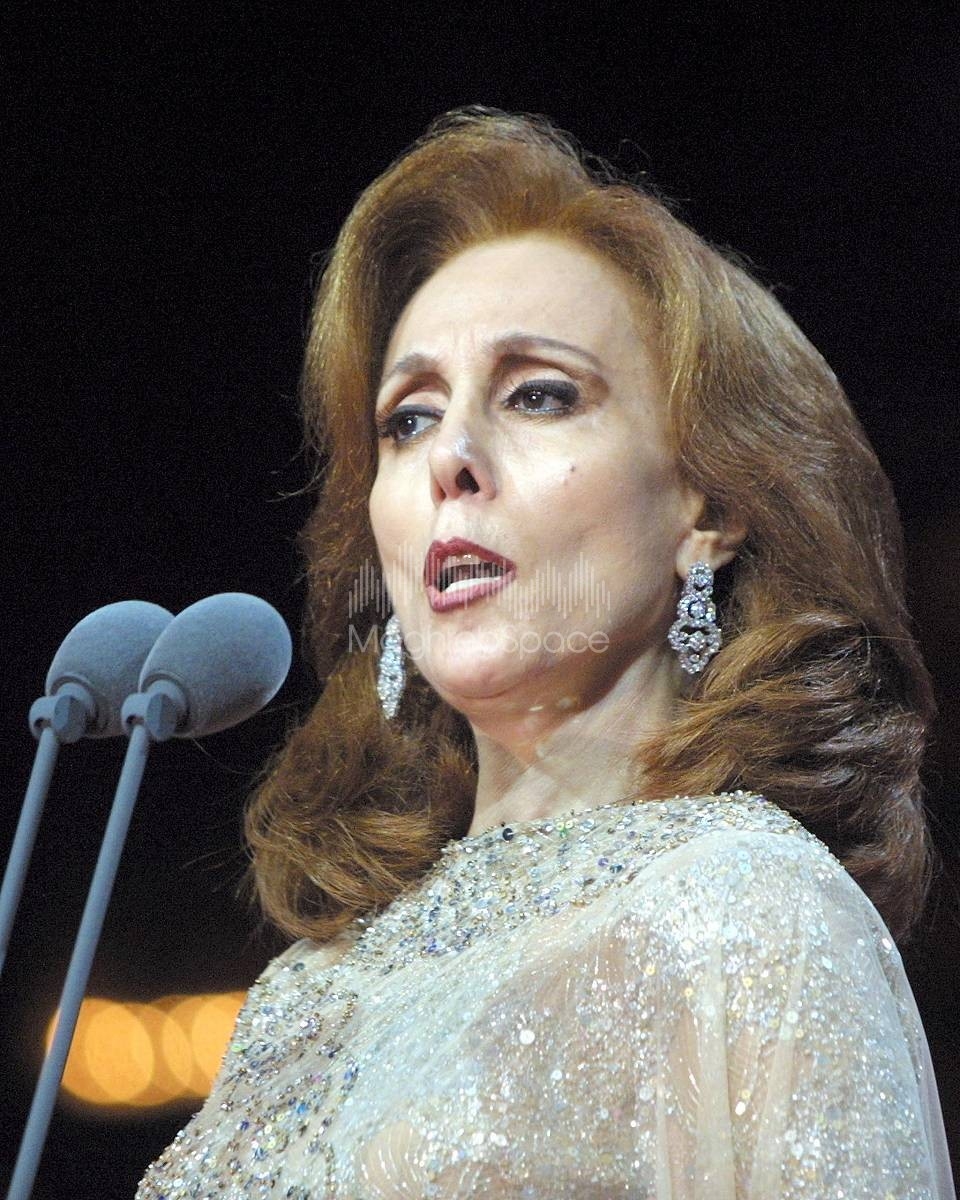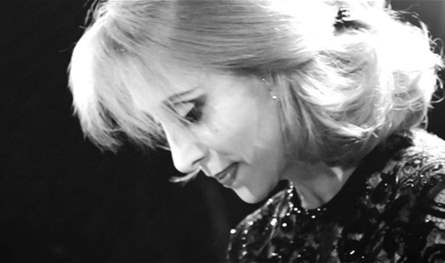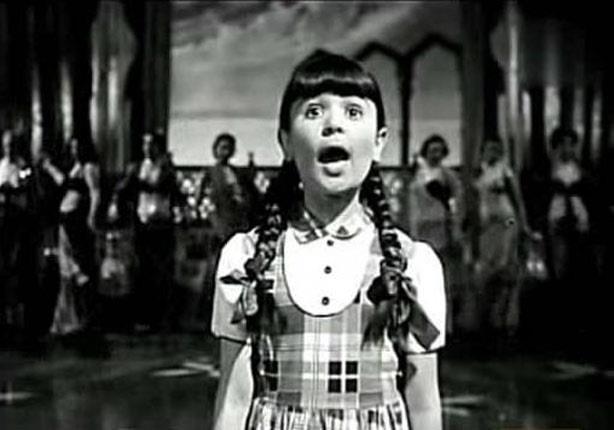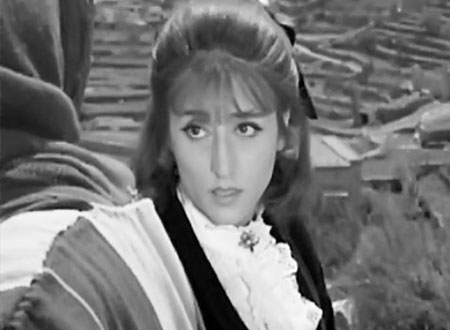


مطر وقهوة مع فيروز واهلا بالحنين
-21-11-2020 ·
عيد ميلاد سيدة الصباحات والمساءات الجميلة كِبر البحر وبُعد السما، رفيقة الدرب وسفيرتنا إلى النجوم الضايعة بورق اللوز والناطرة على الطرقات، فيروز، صوت الطيبة والدفء المُنساب بُكل رقة.. بحبك حتى نجوم الليل نجمة ونجمة تُوقع
ـــــــــــــــــــــــــــــــــــــــ
Fairuz
From Wikipedia, the free encyclopedia
Jump to navigation
Jump to search
Fairuz
فيروز
Fairuz performing in July 2001
Fairuz performing in July 2001
Background information
Birth name Nouhad Wadie’ Haddad
نهاد وديع حداد
Born November 20, 1934 (age 85)
Zuqaq al-Blat, Beirut, State of Greater Lebanon
Origin Lebanon
Genres
Arabic musicLebanese music
Occupation(s)
Singeractress
Instruments Vocals
Years active 1950–present
Labels EMI, Virgin, Voix de l’Orient, Fayrouz Productions
Associated acts Nasri Shamseddine
Wadih el Safi
Website fairouz.com
Spouse(s) Assi El Rahbani
(m. 1955; died 1986)
Children 4 (Ziad, Layal, Hali and Rima)
Nouhad Wadie’ Haddad (Arabic: نهاد وديع حداد; born November 20, 1934[1][2][3][4]), known as Fairuz (Arabic: فيروز), also spelled Fairouz, Feyrouz or Fayrouz, is a Lebanese singer. She is considered by many as one of the leading vocalists and most famous singers in the history of Arab world.[5][6][7][8] Fairuz is considered the musical icon of Lebanon, comparable to Edith Piaf in France, Elvis Presley in the United States and Lys Assia in Switzerland.[9]
Fairuz began her musical career as a teenager at the national radio station in Lebanon in the late 1940s as a chorus member.[10] Her first major hit “Itab” came in 1952 which made her an instant star in the Arab world.[11] In the summer of 1957, Fairuz held her first live performance at the Baalbeck International Festival where she was awarded with the honor of “Cavalier”, the highest medal for artistic achievement by Lebanese president Camille Chamoun.[12][13]
Fairuz’s fame spread throughout the Arab world in the 1950s and 1960s and she would perform outside of Lebanon in various Arab capitals Damascus, Amman, Cairo, Rabat, Algiers, and Tunis. She has received multiple recognitions and awards throughout her career including a Lebanese memorial stamp issued in 1969, the Key to the Holy City awarded by the Jerusalem Cultural Committee, the Jordanian Medal of Honor presented by King Hussein of Jordan, the Commandeur des Arts et des Lettres (Order of Arts and Letters) awarded by French President François Mitterrand in 1988, the Highest Artistic Distinction, awarded by Tunisian President Zine El Abidine Ben Ali, the Chevalier de la Legion d’honneur (National Order of the Legion of Honor) awarded by French President Jacques Chirac and Honorary Doctorate from the American University of Beirut in 2005. [14]
Throughout the years, she headlined at the most important venues in the world such as Albert Hall and Royal Festival Hall in London, Carnegie Hall, Lincoln Center and United Nations General Assembly Lobby in New York, the Olympia and Salle Pleyel in Paris, the Odeon of Herodes Atticus in Athens and the Royal Theatre Carré in Amsterdam.[15]
In a career spanning over six decades, Fairuz has recorded nearly 1500 songs, released more than 80 albums, 20 musicals and sold over 150 million records worldwide, making her the highest selling Middle-Eastern artist of all time and one the best-selling music artists in the world.
Early life
Fairuz (Nouhad Haddad) with her mother Liza al-Boustani, crossing Martyrs’ Square in Beirut, 1945.
Fairuz in 1946.
Nouhad Haddad was born on November 20, 1934 in Lebanon into a Syriac and Maronite Christian family.[21][22][23] Her father was born in Mardin, Turkey. The family later moved into a home in a cobblestone alley called Zuqaq el Blatt in Beirut. Living in a single room of a typical Lebanese stone house facing Beirut’s Eastern Orthodox Patriarchate school, they shared a kitchen with the neighbours. Her father Wadīʿ was a Lebanese of the Syriac Orthodox faith,[24][25] and worked as a typesetter in a print shop.[26]
By the age of ten, Nouhad was already known at school for her unusual singing voice. She would sing regularly during school shows and on holidays. This was how she came to the attention of Mohammed Flayfel, a well known musician and a teacher at the Lebanese Conservatory, who happened to attend one of the school’s shows in February 1950. Impressed by her voice and performance, he advised her to enrol in the conservatory, which she did. At first, Nouhad’s conservative father was reluctant to send her to the conservatory; however, he eventually allowed her to go on condition that her brother accompany her. Overall, Nouhad’s family as a whole encouraged her in her musical career.[27]
During their marriage in the Eastern Orthodox Annunciation Church (Arabic: سيدة البشارة للروم الأرثوذكس بالأشرفية في بيروت), Fairuz and Assi Rahbani surrounded by members of their families, 1955.
Mohammed Flayfel took a close interest in Nouhad’s talent. Among other things, he taught her to recite verses from the Koran (in the recitative style known as Tajweed). On one occasion, Nouhad was heard singing by Halim el Roumi, head of the Lebanese radio station and a prominent musician in his own right (also the father of the famous Lebanese singer Majida Roumi). Roumi was impressed by her voice and noticed that it had a rare flexibility that allowed her to sing both Arabic and Western modes admirably. At Nouhad’s request, El Roumi appointed her as a chorus singer at the radio station in Beirut and went on to compose several songs for her. He chose for her the stage name Fairuz, which is the Arabic word for turquoise.
A short while later, Fairuz was introduced to the Rahbani brothers, Assi and Mansour, who also worked at the radio station as musicians, and they discovered her talent. The chemistry was instant, and soon after, Assi started to compose songs for Fairouz, one of which was “Itab” (the third song he composed for her), which was an immediate smash hit in all of the Arab world, establishing Fairuz as one of the most prominent Arab singers on the Arabic music scene. Assi and Fairuz were married on January 23, 1955.
The Church in, Achrafieh, Beirut where Fairouz married.
Fairuz and Assi had four children: Ziad, a musician and a composer, Layal (died in 1987 of a brain stroke), Hali (paralysed since early childhood after meningitis) and Rima, a photographer and film director.[27]
Fairuz’s first large-scale concert was in 1957, as part of the Baalbeck International Festival which took place under the patronage of the Lebanese President Camille Chamoun. She performed alongside the British prima ballerina Beryl Goldwyn and the Ballet Rambert. Fairuz was paid one Lebanese pound for that show. Musical operettas and concerts followed for many years, eventually establishing Fairuz as one of the most popular singers in Lebanon and throughout the Arab world.
Career
1960s – establishment of a new star
As the 1960s wore on, Fairuz became known as the “First Lady of Lebanese singing”, as Halim Roumi dubbed her.[28] During this period the Rahbani brothers wrote and composed for her hundreds of famous songs, most of their operettas, and three motion pictures.[citation needed]
In 1969, Fairuz’s songs were banned from the radio stations in Lebanon for six months because she refused to sing at a private concert in honour of Algerian President Houari Boumedienne. The incident only served to increase her popularity. Fairuz made it clear then and since that while always willing to sing to the public and to various countries and regions, she would never sing to any individual.[29]
1970s – International fame and war in Lebanon
In 1971, Fairuz’s fame became international after her major North American tour, which was received with much excitement by the Arab-American and American community and yielded very positive reviews of the concerts.
Fairuz in the 1970s
On September 22, 1972, Assi suffered a brain haemorrhage and was rushed to the hospital. Fans crowded outside the hospital praying for him and lighting candles. After three surgeries, Assi’s brain haemorrhage was halted. Ziad Rahbani, the eldest son of Fairuz and Assi, at age 16, gave his mother the music of one of his unreleased songs “Akhadou el Helween” (that he had composed to be sung by Marwan Mahfouz in “Sahriyyi” Ziad’s first play) and his uncle Mansour Rahbani re-wrote new lyrics for it to be called “Saalouni n’Nass” (“The People Asked Me”) which talked about Fayrouz being on stage for the first time without Assi. Three months after suffering the haemorrhage, Assi attended the premiere performance of that musical Al Mahatta in Piccadilly Theatre on Hamra Street. Elias Rahbani, Assi’s younger brother, took over the orchestration and musical arrangement for the performance.
Fairuz made her first European TV appearance on French TV on May 24, 1975, in a “Carpentier special show” called “Numero 1” dedicated to French star Mireille Mathieu. She sang one of her big hits “Habbaytak Bissayf” and was thanked and embraced after performing it by Mireille Mathieu.
Within a year, Assi had returned to composing and writing with his brother. They continued to produce musicals, which became increasingly political in nature. After the Lebanese Civil War erupted, the brothers continued to use political satire and sharp criticism in their plays. In 1977, their musical Petra was shown in both the Muslim western and Christian eastern portions of Beirut.
In 1978, the trio toured Europe and the Persian Gulf nations, including a concert at the Paris Olympia. As a result of this busy schedule, Assi’s medical and mental health began to deteriorate. Fairuz and the brothers agreed to end their professional and personal relationship in 1979. Fairuz began to work with a production team helmed by her son, Ziad Rahbani, and Assi and Mansour composed for other artists such as Ronza.
During the Lebanese Civil War (1975–1990), Fairuz never left Lebanon to live abroad,[30] and did not hold any concerts there with the exception of the stage performance of the operetta Petra, which was performed in both the western and eastern parts of the then-divided Beirut in 1978. However, during that time period, Fairuz held many very successful and record-breaking concerts and tours in numerous countries around the world.
1980s – A new production team
After the artistic divorce between Fairouz and the Rahbani brothers in 1979, Fairuz carried on with her son, composer Ziad Rahbani, his friend the lyricist Joseph Harb, and composer Philemon Wehbe.
Fairuz made a second and final European Television appearance on French TV on October 13, 1988 in a show called Du côté de chez Fred. Fairuz, who had scheduled a concert at the POPB of Paris Bercy concert hall three days later on October 16, was the main guest of French TV presenter Frédéric Mitterrand. The program features footage of her rehearsals for her concert at Bercy in addition to the ceremony featuring then French Minister of Culture Jack Lang awarding Fairuz the medal of Commandeur des Arts et des Lettres. It also includes a video montage of her previous movies and concerts. In that show, Fairuz also sang the three songs “Ya hourrié”, “Yara” and “Zaali tawwal”.
Her first CD, The Very Best of Fairuz was published in 1987 and contained the emblematic song “Aatini al Nay wa ghanni” (Give me the flute and sing)[31] based on a poem in “The Procession”[32] by Khalil Gibran. It was first sung at the end of the sixties.[33]
1990s–present
In the 1990s, Fairuz produced six albums (two Philemon Wehbe tributes with unreleased tracks included, a Zaki Nassif album, three Ziad Rahbani albums, and a tribute album to Assi Rahbani orchestrated by Ziad) and held a number of large-scale concerts, most notably the historic concert held at Beirut’s Martyr’s Square in September 1994 to launch the rebirth of the downtown district that was ravaged by the civil war. She appeared at the Baalbeck International Festival in 1998 after 25 years of self-imposed absence where she performed the highlights of three very successful plays that were presented in the 1960s and 1970s.
In 1992, Madonna used some parts of Fairuz’s songs in her album without permission; the singers settled the matter outside of court, but Madonna’s album and single were prohibited in Lebanon.[27]
She also performed a concert in Las Vegas at the MGM Grand Arena in 1999 which was attended by over 16,000 spectators, mostly Arabs. Ever since, Fairuz has held sold out concerts at the Beiteddine International Festival (Lebanon) from 2000 to 2003, Kuwait (2001), Paris (2002), the United States (2003), Amman (2004), Montreal (2005), Dubai, Abu Dhabi, Baalbeck, BIEL (2006), Athens,[34] Amman (2007) Damascus, and Bahrain (2008).
Her first album in the new millennium Wala Keef, was released in 2002.
On January 28, 2008, Fairuz performed at the Damascus Opera House in an emotional return to the Syrian capital, where she played the lead role in the musical Sah el-Nom (Good Morning), after more than two decades of absence from the country, in one of a series of events highlighting UNESCO’s designation of Damascus as the Capital of Arab Culture that year. Commenting on the event, the BBC wrote: “Every day the sun rises over Syria you hear one voice across the country – Fairuz, the legendary Lebanese singer and greatest living Arab diva”. Syrian historian, Sami Moubayed, said that the Syrians were thrilled about the performance and that Fairuz reminded them of the “good old days”. People from all ages attended the concert and the auditorium was packed with listeners. Fairuz said that she had never seen such an audience in her life. However, her decision to perform there drew criticism from Lebanese politicians who considered Syria to be a hostile nation.[35][36]
Fairuz’s new album entitled Eh… Fi Amal was released on October 7, 2010, produced by Fairuz productions and written entirely by her son Ziad Rahbani. Two concerts took place at BIEL Center in Beirut, Lebanon, on October 7 and 8. Later a concert in Bahrain was cancelled in March 2011. She performed in the Netherlands for the first time in Amsterdam on June 26, 2011. Fairuz’s last appearance on stage was in Platea – Jounieh – Harer Sakher in December 2011, where she had 6 concerts extending from December 9 to 23.[citation needed]
Fairuz released her first album in seven years titled Bebalee on September 22, 2017. On June 21, 2017, her daughter Reema Rahbany released the first single from the album “Lameen”. The song is a tribute for Fairouz’s late husband Assi Rahbany and was released in commemoration of his anniversary. Lameen is inspired by the French song “Pour qui veille l’étoile” and was adapted into Arabic by Reema Rahbany.[37][38][39]
Personal life
Fairouz was born to a Syriac Orthodox family.[40][22][23][41] She is of the Eastern Orthodox Christian faith,[26][42][43] having converted when she married Assi Rahbani, one of the two Rahbani brothers who helped shape her singing career.[44] She is also the mother of the Lebanese composer, pianist and playwright Ziad Rahbani, the late director Layal Rahbani, Lebanese director Rima Rahbani, and Haley Rahbani.[22]
Controversies
2008 Damascus concert
The 2008 concert in Damascus angered some of her fans and several Lebanese politicians who described Syria as “enemy territory in the grip of a brutal secret police force”. Walid Jumblatt, leader of the Druze Progressive Socialist Party, accused Fairuz of “playing into the hands of Syrian intelligence services”, while fellow party member Akram Chehayeb said that “those who love Lebanon do not sing for its jailers,” in reference to the three decades long Syrian occupation of Lebanon. Even some Syrian opposition activists called on her to boycott the event. This came amid a political crisis in Lebanon between pro- and anti-Syria factions, as well as a renewed Syrian government crackdown on dissent that same day during which several people were arrested, including opposition figure Riad Seif and twelve other activists of the anti-government Damascus Declaration.
A poll conducted a week before the concert by NOW Lebanon, a Lebanese web portal sympathetic to the anti-Syria March 14 Alliance, showed that 67% of the respondents were opposed to Fairuz’s appearance in Damascus, with one of the website’s editorials saying that “this was not the moment for a musical love-in”. Fairuz refrained from commenting on the controversy. However, in a letter to the event’s organizers, she said that the concert should be viewed from a cultural perspective, and wrote: “Damascus is not a cultural capital for this year only, but will remain a role model of art, culture and authenticity for the coming generations”. She also told the head of the organizers that she felt it was a return to her second home. Syrian commentator Ayman Abdelnour said that Fairuz was performing to the Syrian people, not their rulers. Her brother-in-law and former partner Mansour Rahbani also defended her decision to perform there, saying it was “a message of love and peace from Lebanon to Syria”.[35][36][45]
Lawsuits
Since many of the Rahbanis’ works were co-written by Assi’s brother Mansour, in June 2010, a year after Mansour’s death in January 2009, a Lebanese court banned Fairuz from singing material that involved his contributions. The issue began when Mansour’s children filed a lawsuit against Fairuz when she was set to perform the song “Ya’ish Ya’ish” at the Casino du Liban. As a result, Fairuz could not perform such works without Mansour’s children’s permission. The court’s decision led to protests around the world in response to what her fans perceived as an act of “silencing”. Hundreds gathered in front of the National Museum of Beirut, led by a number of Arab artists, including Egyptian actress Ilham Chahine who flew to Lebanon in order to join the sit-in. “She is a great artistic personality who has entertained millions for decades. We cannot keep silent over this humiliating attitude to her, and to art and artists in general. Fairouz to me is above all laws. She is like the mother whom, even when she errs, we are eager to forgive,” Chahine added. Ian Black wrote on The Guardian: “Outrage over her silencing has been a reminder of the extraordinary loyalty she still inspires across the region”. Other reactions included a protest concert in Egypt, and a “Shame!” headline displayed by Emirati newspaper Al-Ittihad.[46][47]
Alleged political affiliations
Fairuz’s son, Ziad Rahbani, sparked controversy in December 2013 during an interview with the Al-Ahed website when asked whether his mother shared his supportive stance on the political vision of Hassan Nasrallah, the leader of Hezbollah, a dominant but highly controversial political and military force in Lebanon. Ziad replied: “Fairuz is very fond of Sayyed Hassan [Nasrallah], although she will be displeased with me, as she was after my last television interview, when I revealed some personal information and she quickly interrupted me”.[48] There were strong reactions to this statement, which went viral on social media,[49] and the country’s different media outlets did not deviate from their political stances when reacting to Ziad’s words.[50] Politicians and celebrities stepped in as well, some of whom objected to affiliating Fairuz to one side of Lebanon’s political divide over another, including Druze leader Walid Jumblatt who said: “Fairuz is too great to be criticized, and at the same time too great to be classified as belonging to this or that political camp”. “Let us keep her in her supreme position, and not push her to something she has nothing to do with,” Jumblatt added.[51] Ziad, who claims to speak on his mother’s behalf “because she prefers to remain silent”, responded to his critics by saying: “Apparently it isn’t allowed in the age of strife for the princess of classy Arab art to voice love for the master of resistance”.[51] Nasrallah, commenting on the issue during a speech, stated: “An educated highly respected thinker and artist, who maybe espoused different ideologies, might disagree with you on political matters, but personally have [a] fondness for you, because of your character, conduct, sacrifices and so on. If such a person were to say that he or she liked someone, then all hell would break loose”.[48]
Legacy and honors
Fairuz is the Arab world’s most famous and most listened-to singer. For decades, almost all radio stations in the Arab world have been starting their morning broadcast with a Fairuz song.[52][53] The Guardian stated that “she sang the story of a Lebanon that never really existed” and “essentially helped build the identity of Lebanon, just 14 years after it became an independent country”.[54]
In 1997, Billboard stated “even after five decades at the top, (Fairuz) remains the supreme Diva of Lebanon”.[55] In 1999, The New York Times described her as “a living icon without equal” and stated that her emergence as a singer paralleled Lebanon’s transformation from a backwater to the vibrant financial and cultural heart of the Arab world.[56]
In a 2008 article, BBC described her as “the legendary Lebanese singer and greatest living Arab diva”.[57]
In an article about world music, The Independent stated “All young female singers in this region seem to be clones of her” and that “she’s such an important artist that you have to get to grips with her”.[58]
In her performances, she is hieratic and melancholic, standing motionless in front of the microphone. When questioned by Neil MacFarquhar about her seriousness, she answered that she still feels stage fright. She claims to sing as if she were praying.[59]
Fairuz was honored in many countries such as Lebanon, Syria, Jordan, Palestine, Tunisia, the United States, Egypt and France, in which François Mitterrand awarded her the Order of Arts and Letters in 1988, Jacques Chirac handed her the Legion of Honour in 1998, and Emmanuel Macron who visited her house in Rabieh awarded her the Legion of Honour (Commandeur) on 31 August 2020
